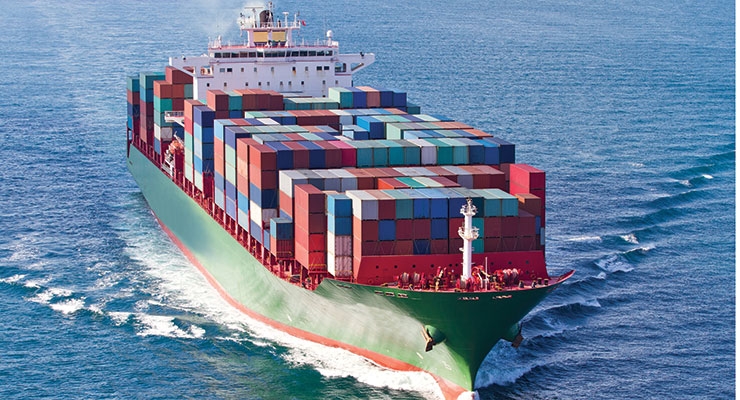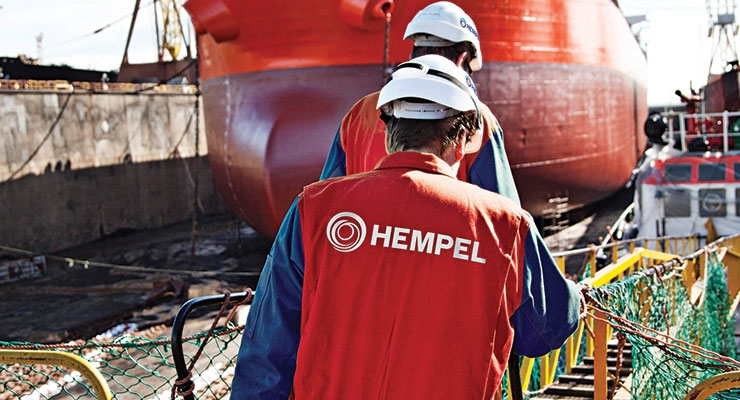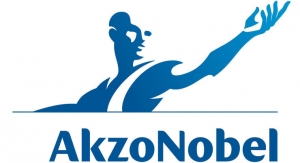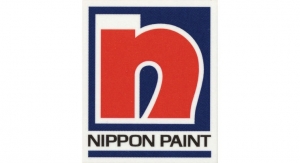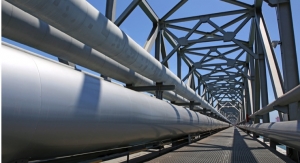Catherine Diamond, Associate Editor08.10.16
Transporting goods by sea has historically been the most widely used form of shipping throughout human history. Though it doesn’t offer the speed of air shipping, it remains the preferred method for larger, heavier goods such as cars. It is also less expensive, less taxing on the environment, and there are virtually no restrictions on destinations. In short, it is nothing less than a driving force behind a functional global economy.
Keeping ships efficient is no small task. Coatings designed for this market are specifically formulated to ensure smooth sailing (pun intended) and as such are used for anti-fouling, anti-corrosion and self-cleaning purposes. Anti-fouling coatings, which are used to protect ships from organisms that can impede performance, have been the most in-demand over the last few years. According to market research firm Transparency Market Research, these coatings are primarily consumed during ship repair and maintenance activities.
In a market study published in October, researchers found that an increase in ship repair and maintenance activities in various regions across the globe is projected to boost the demand for anti-fouling coatings through 2020. Additionally, anti-corrosion coatings are expected to remain stable during the same time period.
“Anti-corrosion coatings are majorly applied during new shipbuilding activities,” the report stated. “These coatings offer protection to the surface from abrasion, corrosion and impact. Foul-release coating is one of the popular marine coatings in the maritime industry. Foul-release coatings are biocide-free and environmentally compatible. Demand for other marine coatings such as self-cleaning and self-polishing coatings is likely to be stable through 2020.”
High demand for marine coatings in Asia Pacific, especially due to the emergence of China as a major player in the shipbuilding industry, is driving the marine coatings market in the region, according to the report. “The need for fuel-saving and low-emission coatings are factors driving the growth of the marine coatings market over the past few years. Growth in the shipbuilding industry in India, Vietnam and the Philippines is expected to provide large opportunities for players in the marine coatings market during the forecast period. However, volatility in prices of raw materials is projected to hamper market growth during the same period.”
Suppliers report that the marine coatings market saw a slight decrease over the last 12 months, though there is reason to believe the market will continue to stabilize and remain strong.
Thomas Molenda, global platform director, marine coatings, PPG, said that lower economic growth and an oversupply of vessels is responsible for stresses in the marine market. “New construction of ships is at low levels and customers are suffering from low freight rates, especially in the dry bulk sector. We’re finding that the tanker segments have performed much better than dry cargo,” he said. “Globalization will continue to be a positive macro trend that will benefit the shipping industry. Although the new construction markets are operating at low levels, maintenance and repair has been more robust.”
Christian Ottosen, Hempel Hempel A/S group vice president, marine marketing, said that “tough times” for shipping companies have created an increased demand for premium coatings, as they help to improve operational efficiency.
Last year, he added, there were a great number of ships entering mandatory dry docking. “This large volume of dry dockings was a result of the 2010/2011 new building deliveries reaching their first mandatory dry docking, coupled with the fact that many ship owners dry docked earlier than scheduled, due to the anticipated requirement to fit ballast water treatment systems. Dry docking activity in 2016, however, is noticeably different, with the market down to the more ‘normal’ levels of 2014.”
Growth in this market is being driven, in general, by the size of the global market fleet, Ottosen said. “2015 showed a growth in the world fleet capacity of 3.3 percent, which poses both growth opportunities for the industry but at the same time poses challenges to ship owners. Moreover,” he added, “the IMO water ballast regulations were, at the time, expected to come into force in January 2016, which provided an incentive to ship owners to dry dock their vessels earlier than scheduled in order to postpone the installation of expensive water ballast water treatment systems. This lead to a general increase of 25-30 per cent, globally, of dry dockings in 2015. 2015 also witnessed an increase in activity for the sale and purchase market, with the number of transactions 25 per cent higher than the average volume of tonnage sold between 2010 and 2014, leading to more vessels being dry docked after the transaction.”
Trends: beyond green
While the needs of the marine market tend to be consistent, an uptick in environmental initiatives has directly impacted this market.
Oscar Wezenbeek, managing director, AkzoNobel Marine Coatings, said that ship owners and operators “are facing increasingly tough times, with continued low freight rates, a lack of liquidity, and impending environmental regulations.” Pressures from charterers, he added, and shippers to improve operational and environmental efficiencies, as well as sustainability within the supply chain, add further challenges.
“At AkzoNobel we understand the challenges that our customers face, and gear all the research and development that goes into creating our products and services towards providing solutions that help to alleviate these pressures. In line with this, we have seen an increase in the uptake of premium hull coatings, such as our Intersleek range of products that improve operational and environmental efficiencies, reducing fuel consumption and associated costs and emissions.
“In addition, we also developed shipping industry’s first carbon credits methodology. Launched in 2014 in conjunction with The Gold Standard Foundation and Fremco Group, the scheme is based on ship owners converting existing vessels from a biocidal antifouling system to a premium, biocide-free hull coating such as Intersleek. The pioneering methodology financially rewards ship owners for using sustainable hull coatings that improve operational efficiencies and reduce emissions.”
Ottosen of Hempel added that, in the marine segment, many vessel owners and operators are looking to improve fuel efficiency in order to drive long-term cost reductions.
“Looking at paint supplies from a ‘Total Cost of Ownership’ perspective is becoming increasingly more and more important, and we are focusing on assisting our customers to be more competitive by helping them reduce their operational costs,” he said.
“Evolving environmental regulations have been a key influencer for innovation and technological advances in our sector. These new regulations demand antifouling products with lower VOCs, higher solids and less harmful biocides while, at the same time, providing superior performance, which is why we have invested heavily in R&D to modify and develop new coatings that meet ship owners’ environmental requirements.”
The current overcapacity in the market, Ottosen said, which has developed in several shipping sectors, freight rates are low and volatile, has put pressure on ship owners and operators to constantly seek efficiencies that save time and cost.
“The recent trend for slow steaming is continuing, despite the lower oil price, meaning anti-foulings that had previously relied on the relatively fast movement of the vessel through the water to help remove biological organisms are now becoming less effective. This has paved the way for a new generation of marine coatings,” he said.
Areas of growth, focus
While the Asia Pacific market has been the source of the greatest growth in recent years, there has been a slight decline in activity there due to decreased contracting of new vessels. AkzoNobel’s Wezenbeek said that recently enacted environmental regulations – such as biocidal production regulations – have significantly affected the market. Suppliers and fleet owners are also watching the Asia Pacific market carefully to determine whether or not those countries will also enact their own environmental regulations.
Wezenbeek said, “At AkzoNobel, we are leading the industry when it comes to environmental regulations and sustainability. All products manufactured by AkzoNobel are currently registered under national laws within the European Union. Under the new BPR requirements, once the active ingredients are assessed, we will be required to seek re-approval for our products. Dossiers for product authorization under BPR are expected to be submitted within the next two to three years. The precise legal timescales for this are yet to be published. However, we know that the authorization process can then take up to three years after the dossier submissions are complete, which means that BPR is not expected to impact product approvals for at least three years.”
Wezenbeek added that all biocides currently used in AkzoNobel’s EU anti-foulings are supported under the BPR. “Depending on the final requirements of the BPR human and environmental risk assessments (some aspects of which are yet to be established by the EU authorities) changes to formulations may be required, but at this stage it is too early to provide a definitive answer. In addition, we are actively working in China and Korea to respect the legislation, as it evolves,” he said.
Developing new products that minimize the industry’s impact on the world’s oceans, Ottosen said, is at the top of Hempel’s agenda.
“We understand the marine industry is under increasing pressure to be both more efficient and to comply with evolving environmental regulations. We believe that the marine coatings market can assist ship operators meet their environmental obligations by offering and developing coatings with a high solids ratio.
“The higher the solid content, the less volatile organic compounds (VOCs) are released into the atmosphere on application, and 77 percent solids are becoming fairly standard for many Hempel products. The positive side effect of a high solids content is that less paint evaporates on application ensuring more is applied to the vessel – less waste equals less cost - increasing our customer’s operational efficiency,” he said.
Ottosen added that environmental legislation in China is also becoming increasingly strict. In February 2015, a new tax on VOCs came into effect. “A growth in Chinese public awareness of environmental issues, particularly with regard to air quality, means that we can expect more such legislation in the future,” he concluded.
PPG’s Molenda said that as regulations spur ongoing change in the industry, PPG continues to prioritize the development of new environmentally-friendly products. “We, as PPG, have to be responsive in order to find solutions for our customers. We’re already seeing stronger environmental regulations coming from some Asian countries and we expect that this will continue,” he said.
New technologies, products
Marine coatings suppliers are frequently introducing new technologies to the market. What follows is information on these new innovations from select manufacturers, in their own words.
AkzoNobel
Intertrac Vision is the industry’s first big data consultancy tool, which predicts the performance of coatings prior to their application, improving the rigor of product selection to meet the precise needs of our customers’ businesses, operations, trading routes and commitment to sustainability. Using more than 3.5 billion data points, Intertrac Vision provides accurate and transparent predictions on the fuel and CO2 savings potential of all our products, and incorporates ship powering requirements for representative hull forms including LNG carriers, bulkers, tankers, container ships and cruise vessels.
From a product perspective, the most recent coating launched to the market in March 2016 is Intercept 8500 LPP, AkzoNobel’s highest-performing biocidal antifouling in the company’s International range of marine coatings.
Intercept 8500 LPP is the culmination of ten years of R&D, and investment in innovation by AkzoNobel’s research scientists, hydrodynamicists and marine biologists. The coating provides multiple benefits to ship owners and operators, including improvements in operational, cost and environmental efficiencies. These are delivered through Intercept 8500 LPP’s consistent predictable linear polishing fouling control performance, which lasts for in-service periods of up to 90 months, even on high risk fouling routes. Intercept 8500 LPP also comes with extended performance guarantees, proven in-service performance on high fouling routes, and a unique polymer combination that incorporates AkzoNobel’s patented Lubyon technology with a silyl methacrylate self-polishing copolymer.
AkzoNobel’s Marine Coatings business has also recently launched a best-in-class anticorrosive universal primer, Intershield One-2-One, which delivers simplified maintenance, waste avoidance and enhanced corrosion protection.
This is a surface tolerant universal primer for use during on board maintenance. It is based on the company’s Intershield 300 pure epoxy technology, which provides a unique balance of abrasion and corrosion resistance with optimum levels of hardness and flexibility, delivering long-term performance and effective corrosion control.
Application of Intershield One-2-One can reduce paint wastage significantly, as well as reducing the risk of incorrect mixing and subsequent coating failure. These benefits are possible thanks to the availability of small crew-friendly pack sizes with an equal mix ratio that can be handled with ease by users.
Hempel
Hempel’s fuel-saving hull coatings package is the most comprehensive on the market, and we also offer a number of other cost-saving coatings. A cargo hold coating for bulk carriers was launched in 2014 named Hempadur Impact, which protects ship cargo holds from both mechanical damage and the severe abrasion caused by loading hard, angular cargoes. With a short drying time and a seven and-a-half year major repair interval, this product ensures vessels spend less time in drydock and significantly reduces maintenance requirements.
In Asia Pacific, Hempel launched Hempadur Easy, a durable epoxy primer that was developed in response to customer demands for a reliable, user-friendly and flexible coating for use in drydock under all climatic conditions. Hempadur Easy can be used on almost all vessel surfaces. It requires minimal surface preparation and offers fast drying and re-coating times, which enables customers to reduce costs by spending less time in drydock.
In addition, Hempel extended its Hempadur Quattro XO range of ballast tank coatings to include a number of specific versions developed to suit different yard working methods and VOC requirements. Hempadur Quattro XO products are IMO PSPC (Performance Standard for Protective Coatings) approved for water ballast tanks and COT (crude oil tanker) approved, and they offer extended over-coating windows and optimised workability for greater shipyard efficiency.
PPG
Companywide, PPG invests approximately $1 billion every two years on improving our coatings to bring more value to our customers. Some specific innovations available to our marine customers include:
Sigma Sailadvance range: a series of antifoulant products that utilize PPG’s controlled surface active polymers (CSP) technology. These products boast superior fouling protection, longer idle times and improved low-friction surface properties.
Sigmashield MTC: a premium cargo hold coating which utilizes a unique chemistry and delivers outstanding mechanical, thermal and corrosive protection to dry cargo holds.
By Joe Husseini, International Sales and Trading director, U.S. Zinc
The marketplace is experiencing a recent uptick in demand for zinc. As a result, zinc inventories are falling and the prices are rising. Since the start of 2016, zinc has risen by almost 40 percent on the London Metal Exchange Index (LME). Specifically, there is a great demand for both zinc oxide and zinc dust in the marketplace. Helping meet this global demand with ample capacity, U.S. Zinc operates four zinc oxide manufacturing locations and the largest single-site zinc dust plant in the world. U.S. Zinc relies on its connections with major zinc metal suppliers for its raw material supply, which is comprised of recycled zinc from various galvanizers and special high grade zinc from the smelters.
U.S. Zinc is a major supplier of zinc oxide and zinc dust. Zinc oxide is found in rubber and tire, ceramics, lubricants, chemical and pharmaceutical products for a variety of enhancement purposes. Zinc dust is used in primer coatings for marine and industrial applications to inhibit corrosion. Zinc used in the galvanizing process acts to inhibit steel corrosion, which dramatically extends the life of the material in marine environments by protecting it from oxidation and water.
With the rebound in the steel markets, galvanizing services are in strong demand. The galvanizing process occurs in a couple of ways. The batch process in hot dip galvanizing, or HDG, is used to coat components with zinc in smaller applications for fabricators and smaller manufacturers. The continuous galvanizers, or steel mills, are typically larger individual plants than their
HDG counterparts, coating steel sheet coils with zinc. Ships, bridges, rigs and other marine-grade equipment have galvanization and zinc to thank for this great protection.
Keeping ships efficient is no small task. Coatings designed for this market are specifically formulated to ensure smooth sailing (pun intended) and as such are used for anti-fouling, anti-corrosion and self-cleaning purposes. Anti-fouling coatings, which are used to protect ships from organisms that can impede performance, have been the most in-demand over the last few years. According to market research firm Transparency Market Research, these coatings are primarily consumed during ship repair and maintenance activities.
In a market study published in October, researchers found that an increase in ship repair and maintenance activities in various regions across the globe is projected to boost the demand for anti-fouling coatings through 2020. Additionally, anti-corrosion coatings are expected to remain stable during the same time period.
“Anti-corrosion coatings are majorly applied during new shipbuilding activities,” the report stated. “These coatings offer protection to the surface from abrasion, corrosion and impact. Foul-release coating is one of the popular marine coatings in the maritime industry. Foul-release coatings are biocide-free and environmentally compatible. Demand for other marine coatings such as self-cleaning and self-polishing coatings is likely to be stable through 2020.”
High demand for marine coatings in Asia Pacific, especially due to the emergence of China as a major player in the shipbuilding industry, is driving the marine coatings market in the region, according to the report. “The need for fuel-saving and low-emission coatings are factors driving the growth of the marine coatings market over the past few years. Growth in the shipbuilding industry in India, Vietnam and the Philippines is expected to provide large opportunities for players in the marine coatings market during the forecast period. However, volatility in prices of raw materials is projected to hamper market growth during the same period.”
Suppliers report that the marine coatings market saw a slight decrease over the last 12 months, though there is reason to believe the market will continue to stabilize and remain strong.
Thomas Molenda, global platform director, marine coatings, PPG, said that lower economic growth and an oversupply of vessels is responsible for stresses in the marine market. “New construction of ships is at low levels and customers are suffering from low freight rates, especially in the dry bulk sector. We’re finding that the tanker segments have performed much better than dry cargo,” he said. “Globalization will continue to be a positive macro trend that will benefit the shipping industry. Although the new construction markets are operating at low levels, maintenance and repair has been more robust.”
Christian Ottosen, Hempel Hempel A/S group vice president, marine marketing, said that “tough times” for shipping companies have created an increased demand for premium coatings, as they help to improve operational efficiency.
Last year, he added, there were a great number of ships entering mandatory dry docking. “This large volume of dry dockings was a result of the 2010/2011 new building deliveries reaching their first mandatory dry docking, coupled with the fact that many ship owners dry docked earlier than scheduled, due to the anticipated requirement to fit ballast water treatment systems. Dry docking activity in 2016, however, is noticeably different, with the market down to the more ‘normal’ levels of 2014.”
Growth in this market is being driven, in general, by the size of the global market fleet, Ottosen said. “2015 showed a growth in the world fleet capacity of 3.3 percent, which poses both growth opportunities for the industry but at the same time poses challenges to ship owners. Moreover,” he added, “the IMO water ballast regulations were, at the time, expected to come into force in January 2016, which provided an incentive to ship owners to dry dock their vessels earlier than scheduled in order to postpone the installation of expensive water ballast water treatment systems. This lead to a general increase of 25-30 per cent, globally, of dry dockings in 2015. 2015 also witnessed an increase in activity for the sale and purchase market, with the number of transactions 25 per cent higher than the average volume of tonnage sold between 2010 and 2014, leading to more vessels being dry docked after the transaction.”
Trends: beyond green
While the needs of the marine market tend to be consistent, an uptick in environmental initiatives has directly impacted this market.
Oscar Wezenbeek, managing director, AkzoNobel Marine Coatings, said that ship owners and operators “are facing increasingly tough times, with continued low freight rates, a lack of liquidity, and impending environmental regulations.” Pressures from charterers, he added, and shippers to improve operational and environmental efficiencies, as well as sustainability within the supply chain, add further challenges.
“At AkzoNobel we understand the challenges that our customers face, and gear all the research and development that goes into creating our products and services towards providing solutions that help to alleviate these pressures. In line with this, we have seen an increase in the uptake of premium hull coatings, such as our Intersleek range of products that improve operational and environmental efficiencies, reducing fuel consumption and associated costs and emissions.
“In addition, we also developed shipping industry’s first carbon credits methodology. Launched in 2014 in conjunction with The Gold Standard Foundation and Fremco Group, the scheme is based on ship owners converting existing vessels from a biocidal antifouling system to a premium, biocide-free hull coating such as Intersleek. The pioneering methodology financially rewards ship owners for using sustainable hull coatings that improve operational efficiencies and reduce emissions.”
Ottosen of Hempel added that, in the marine segment, many vessel owners and operators are looking to improve fuel efficiency in order to drive long-term cost reductions.
“Looking at paint supplies from a ‘Total Cost of Ownership’ perspective is becoming increasingly more and more important, and we are focusing on assisting our customers to be more competitive by helping them reduce their operational costs,” he said.
“Evolving environmental regulations have been a key influencer for innovation and technological advances in our sector. These new regulations demand antifouling products with lower VOCs, higher solids and less harmful biocides while, at the same time, providing superior performance, which is why we have invested heavily in R&D to modify and develop new coatings that meet ship owners’ environmental requirements.”
The current overcapacity in the market, Ottosen said, which has developed in several shipping sectors, freight rates are low and volatile, has put pressure on ship owners and operators to constantly seek efficiencies that save time and cost.
“The recent trend for slow steaming is continuing, despite the lower oil price, meaning anti-foulings that had previously relied on the relatively fast movement of the vessel through the water to help remove biological organisms are now becoming less effective. This has paved the way for a new generation of marine coatings,” he said.
Areas of growth, focus
While the Asia Pacific market has been the source of the greatest growth in recent years, there has been a slight decline in activity there due to decreased contracting of new vessels. AkzoNobel’s Wezenbeek said that recently enacted environmental regulations – such as biocidal production regulations – have significantly affected the market. Suppliers and fleet owners are also watching the Asia Pacific market carefully to determine whether or not those countries will also enact their own environmental regulations.
Wezenbeek said, “At AkzoNobel, we are leading the industry when it comes to environmental regulations and sustainability. All products manufactured by AkzoNobel are currently registered under national laws within the European Union. Under the new BPR requirements, once the active ingredients are assessed, we will be required to seek re-approval for our products. Dossiers for product authorization under BPR are expected to be submitted within the next two to three years. The precise legal timescales for this are yet to be published. However, we know that the authorization process can then take up to three years after the dossier submissions are complete, which means that BPR is not expected to impact product approvals for at least three years.”
Wezenbeek added that all biocides currently used in AkzoNobel’s EU anti-foulings are supported under the BPR. “Depending on the final requirements of the BPR human and environmental risk assessments (some aspects of which are yet to be established by the EU authorities) changes to formulations may be required, but at this stage it is too early to provide a definitive answer. In addition, we are actively working in China and Korea to respect the legislation, as it evolves,” he said.
Developing new products that minimize the industry’s impact on the world’s oceans, Ottosen said, is at the top of Hempel’s agenda.
“We understand the marine industry is under increasing pressure to be both more efficient and to comply with evolving environmental regulations. We believe that the marine coatings market can assist ship operators meet their environmental obligations by offering and developing coatings with a high solids ratio.
“The higher the solid content, the less volatile organic compounds (VOCs) are released into the atmosphere on application, and 77 percent solids are becoming fairly standard for many Hempel products. The positive side effect of a high solids content is that less paint evaporates on application ensuring more is applied to the vessel – less waste equals less cost - increasing our customer’s operational efficiency,” he said.
Ottosen added that environmental legislation in China is also becoming increasingly strict. In February 2015, a new tax on VOCs came into effect. “A growth in Chinese public awareness of environmental issues, particularly with regard to air quality, means that we can expect more such legislation in the future,” he concluded.
PPG’s Molenda said that as regulations spur ongoing change in the industry, PPG continues to prioritize the development of new environmentally-friendly products. “We, as PPG, have to be responsive in order to find solutions for our customers. We’re already seeing stronger environmental regulations coming from some Asian countries and we expect that this will continue,” he said.
New technologies, products
Marine coatings suppliers are frequently introducing new technologies to the market. What follows is information on these new innovations from select manufacturers, in their own words.
AkzoNobel
Intertrac Vision is the industry’s first big data consultancy tool, which predicts the performance of coatings prior to their application, improving the rigor of product selection to meet the precise needs of our customers’ businesses, operations, trading routes and commitment to sustainability. Using more than 3.5 billion data points, Intertrac Vision provides accurate and transparent predictions on the fuel and CO2 savings potential of all our products, and incorporates ship powering requirements for representative hull forms including LNG carriers, bulkers, tankers, container ships and cruise vessels.
From a product perspective, the most recent coating launched to the market in March 2016 is Intercept 8500 LPP, AkzoNobel’s highest-performing biocidal antifouling in the company’s International range of marine coatings.
Intercept 8500 LPP is the culmination of ten years of R&D, and investment in innovation by AkzoNobel’s research scientists, hydrodynamicists and marine biologists. The coating provides multiple benefits to ship owners and operators, including improvements in operational, cost and environmental efficiencies. These are delivered through Intercept 8500 LPP’s consistent predictable linear polishing fouling control performance, which lasts for in-service periods of up to 90 months, even on high risk fouling routes. Intercept 8500 LPP also comes with extended performance guarantees, proven in-service performance on high fouling routes, and a unique polymer combination that incorporates AkzoNobel’s patented Lubyon technology with a silyl methacrylate self-polishing copolymer.
AkzoNobel’s Marine Coatings business has also recently launched a best-in-class anticorrosive universal primer, Intershield One-2-One, which delivers simplified maintenance, waste avoidance and enhanced corrosion protection.
This is a surface tolerant universal primer for use during on board maintenance. It is based on the company’s Intershield 300 pure epoxy technology, which provides a unique balance of abrasion and corrosion resistance with optimum levels of hardness and flexibility, delivering long-term performance and effective corrosion control.
Application of Intershield One-2-One can reduce paint wastage significantly, as well as reducing the risk of incorrect mixing and subsequent coating failure. These benefits are possible thanks to the availability of small crew-friendly pack sizes with an equal mix ratio that can be handled with ease by users.
Hempel
Hempel’s fuel-saving hull coatings package is the most comprehensive on the market, and we also offer a number of other cost-saving coatings. A cargo hold coating for bulk carriers was launched in 2014 named Hempadur Impact, which protects ship cargo holds from both mechanical damage and the severe abrasion caused by loading hard, angular cargoes. With a short drying time and a seven and-a-half year major repair interval, this product ensures vessels spend less time in drydock and significantly reduces maintenance requirements.
In Asia Pacific, Hempel launched Hempadur Easy, a durable epoxy primer that was developed in response to customer demands for a reliable, user-friendly and flexible coating for use in drydock under all climatic conditions. Hempadur Easy can be used on almost all vessel surfaces. It requires minimal surface preparation and offers fast drying and re-coating times, which enables customers to reduce costs by spending less time in drydock.
In addition, Hempel extended its Hempadur Quattro XO range of ballast tank coatings to include a number of specific versions developed to suit different yard working methods and VOC requirements. Hempadur Quattro XO products are IMO PSPC (Performance Standard for Protective Coatings) approved for water ballast tanks and COT (crude oil tanker) approved, and they offer extended over-coating windows and optimised workability for greater shipyard efficiency.
PPG
Companywide, PPG invests approximately $1 billion every two years on improving our coatings to bring more value to our customers. Some specific innovations available to our marine customers include:
Sigma Sailadvance range: a series of antifoulant products that utilize PPG’s controlled surface active polymers (CSP) technology. These products boast superior fouling protection, longer idle times and improved low-friction surface properties.
Sigmashield MTC: a premium cargo hold coating which utilizes a unique chemistry and delivers outstanding mechanical, thermal and corrosive protection to dry cargo holds.
By Joe Husseini, International Sales and Trading director, U.S. Zinc
The marketplace is experiencing a recent uptick in demand for zinc. As a result, zinc inventories are falling and the prices are rising. Since the start of 2016, zinc has risen by almost 40 percent on the London Metal Exchange Index (LME). Specifically, there is a great demand for both zinc oxide and zinc dust in the marketplace. Helping meet this global demand with ample capacity, U.S. Zinc operates four zinc oxide manufacturing locations and the largest single-site zinc dust plant in the world. U.S. Zinc relies on its connections with major zinc metal suppliers for its raw material supply, which is comprised of recycled zinc from various galvanizers and special high grade zinc from the smelters.
U.S. Zinc is a major supplier of zinc oxide and zinc dust. Zinc oxide is found in rubber and tire, ceramics, lubricants, chemical and pharmaceutical products for a variety of enhancement purposes. Zinc dust is used in primer coatings for marine and industrial applications to inhibit corrosion. Zinc used in the galvanizing process acts to inhibit steel corrosion, which dramatically extends the life of the material in marine environments by protecting it from oxidation and water.
With the rebound in the steel markets, galvanizing services are in strong demand. The galvanizing process occurs in a couple of ways. The batch process in hot dip galvanizing, or HDG, is used to coat components with zinc in smaller applications for fabricators and smaller manufacturers. The continuous galvanizers, or steel mills, are typically larger individual plants than their
HDG counterparts, coating steel sheet coils with zinc. Ships, bridges, rigs and other marine-grade equipment have galvanization and zinc to thank for this great protection.

